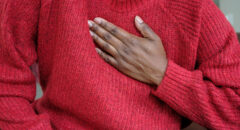
Recent studies showed that Black patients, particularly women, had poorer life expectancy after a heart attack than other races. In order for Blacks to increase their life expectancy and prevent a second heart attack, they need to make lifestyle changes. Heart attack survivors could gain more than seven healthy years of life if they take the right medications and improve their lifestyle, new research estimates.
Unfortunately, studies have found, heart attack survivors rarely get optimal control over their risk factors.
The new research echoes that evidence: Of more than 3,200 patients, only 2% had their blood pressure, cholesterol and blood sugar under good control one year after their heart attack or heart procedure.
Overall, 65% still had high levels of "bad" LDL cholesterol, while 40% had high blood pressure. Things looked just as bad when it came to lifestyle -- with 79% of patients being overweight or obese, and 45% not getting enough exercise.
It all points to major missed opportunities, the researchers say.
Using a mathematical model, they estimated that if study patients' risk factors were being optimally controlled, they could gain 7.4 extra years free of a heart attack or stroke.
READ: Survived a Heart Attack? Long Work Hours Raise Your Odds for Another
Why were so many patients falling short of treatment goals? It's likely a combination of things, researcher Tinka Van Trier, of Amsterdam University Medical Center in the Netherlands says.
Most patients were, in fact, on medication, including drugs to control
cholesterol and blood pressure, or to prevent blood clots.
But they may not have been on the optimal doses or combinations of medication, Van Trier says.
And then there were the lifestyle factors, which can have a particular impact on blood pressure, cholesterol and blood sugar.
Van Trier presented the findings at the annual meeting of the European Society of Cardiology, being held online.
Dr. Andrew Freeman, a cardiologist says it begs an important question.
"Why aren't we being more aggressive in risk factor control?" Freeman, who directs cardiovascular prevention and wellness at National Jewish Health in Denver asks.
Like Van Trier, he says that simply being on medication may not be enough: When patients' numbers are not where they should be, adjustments to medication doses and combinations may be necessary.
Just as important, though, is exercise, a healthy diet and weight management. Freeman encourages patients to move toward a
plant-based diet, high in foods like fruits, vegetables, beans, nuts and fiber-rich grains.
Cardiac rehabilitation programs are where people can find help. Those programs can be prescribed in the aftermath of a heart attack so that patients can have supervised exercise and, often, other services -- such as nutrition advice and help with quitting smoking and stress reduction.
"I'm an enormous fan of cardiac rehab," Dr. Donald Lloyd-Jones, president of the American Heart Association shares.
After a heart attack, people can be fearful about exercise, depressed, or feel like it's "too late" to do anything about their cardiovascular health.
"Cardiac rehab gets patients into a monitored setting where they can learn to trust their bodies again," Lloyd-Jones says.
There are also resources outside of cardiac rehab. Van Trier advises patients to talk to their doctor about any help they need with quitting smoking or referral to a dietitian for help with nutrition and weight loss. Doctors may also be able to recommend community exercise programs, she says.
As for medications, Lloyd-Jones says patients should always bring any concerns to their doctor: If you're worried about a potential side effect, talk to your doctor rather than stopping a medication.
Family support is always key, all three experts note.
It's easier for patients to eat better, exercise or refrain from smoking when someone else is in it with them, according to Freeman. And if the whole family is making healthy choices, everyone's heart health will benefit.








